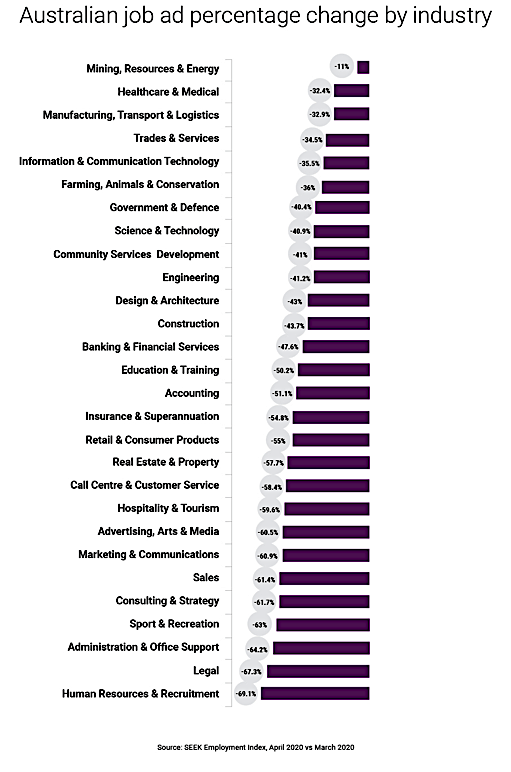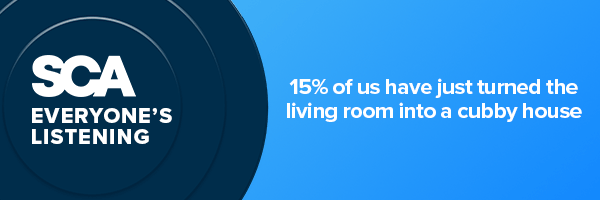While Australia’s unemployment rate has jumped to 6.2 per cent in April, up from 5.2 per cent in March, radio is only just coming to terms with the overall impact of COVID-19.
Most telling has been the number of job ads that have dropped on sites such as SEEK, with categories like Advertising, Arts, Media down by 56.1 per cent in April and 60.5 per cent this month.
Currently there are eight radio related positions being advertised on SEEK, ranging from journalists to producers, technicians to account director.
With direct sales suffering declines of 40 per cent or more, and even with JobKeeper in place, holding onto staff, let alone recruiting new staff, is becoming more difficult as the lockdown continues.
The radioinfo site has seen a sharp decline in the number of job ads being placed, and radioinfo publisher, Steve Ahern, says, “It’s very tight in the radio industry at the moment as we know. In the past month we have seen a 100% decrease in job ads from normal months. There have been none on the site for 3 weeks until today.
“December and January are normally quiet, while May/June and September/October are usually our businest months for jobs due to the financial year end and, later, contract renewal season.
“Commercial station job ads dried up first, then the community sector. The last to go were the national broadcasters.
“It’s understandable. At a time when companies are cutting hours and salaries, even if they had jobs to fill they would wait until their existing workforce got back to normal first. When they resume it will be an indication of confidence returning.
“I have been speaking to industry leaders in the past two weeks about the state of play as things open up again. Their consistent comments are first, that they really appreciate the government’s Jobkeeper program because it has allowed them to keep most people on even when revenue is done and second, that they are all cautiously optimistic about a good recovery, but the only uncertainty is when.
“A lot of employers have told me that Seek is too expensive at $275 per job (our jobs board costs less), and that they get lots of unqualified people applying with no experience in the radio or media industries, so they prefer targeted sites like ours when they are serious about finding the right people.
“When things do get back to normal I expect that there will be pent up demand and lots of ads will come back all at once.
“Interestingly, we have had dozens of emails from people scanning the site and telling us that they will be ready to apply for jobs when they return. This is not a normal trend, and it tells me there is also pent up demand in the job seeker market, so employers will have good fields to choose from when they resume their job advertising.”
The Seek employment chart, April 2020 compared with March 2020, indicates a 60.5% fall in the Advertising, Arts and Media category.

Subscribe to the radioinfo daily flash briefing podcast on these platforms: Acast, Apple iTunes Podcasts, Podtail, Spotify, Google Podcasts, TuneIn, or wherever you get your podcasts.





This is an observation on the kinds of media jobs advertised and those which are not advertised. If I'm wrong then I'm wrong.
When I applied for a traineeship in broadcasting, I responded to an advertisement in the SMH.
If one was working for a statutory authority or large business, the positions would normally be advertised internally and sometimes externally. Internally-advertised positions were not available to the public.
Sometimes if one was working in organization X, a person from organization Y would ring up and say "....does anyone want a job at organization Y in a 'particular division' ?" Such positions generally were not publicly advertised. Though one broadcasting organisation ('Y') advertised that job in a 'particular division' for several months in the SMH.
I stand corrected for this. Most of the jobs advertised were generally for engineering, production, clerical and miscellaneous positions. This may be in the newspapers and digital job placement sites such as seek.
In these days of job reduction or cutting hours, it may well be that recruiting of staff may well be 'internal' rather than externally-advertised jobs once the business picks up - this does not only apply to media jobs, it could well be coffee shops where the 'boss' calls a redudant worker "....hey our business is picking up....would you like your job back......"
HOWEVER, my observation is that presenter jobs on radio and tv have never been advertised to the public in a the "jobs vacant" section in the newspapers, Seek or even the Centrelink/Job agency computers. This is regardless of whether the positions were for the ABC/SBS or commercial media.
Maybe some positions are advertised on this website or "Jock's Journal".
But generally it seems that for presenters positions are not obtained by well-worn paths of the journal, newspaper, Seek and Centrelink/Job Club.
It may well be that other kinds of positions in the media may well come from non-conventional paths based on people working within a particular media organization.
For example, while listening to 2GB's Ben Fordham's afternoon program, he'd often talk about new appointments such as production assistants who were invited and recommended by someone within 9Media/2GB. Even for Ben himself being appointed to the breakfast program, it was a personal recommendation not from responding to newspaper advertisements, Seek, media journals or the Centrelink/Job Club computers.
As the economy improves, unless there is no need to employ or there is no destructive technologies, it may well be that former employees or new employees will get a media position or any kind of job through personal recommendation in which the statistics are not reflected in the "job advertisement" statistics obtained from newspapers, job agencies and Seek.
Thank you,
Anthony from thinking Belfield